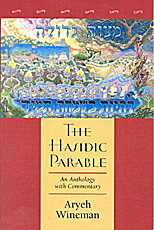Aryeh Wineman is a specialist in Jewish mystic studies and their narrative traditions. He is Rabbi of Temple Beth El in Troy, New York. Hasidism — the Jewish pietistic movement that emerged in eighteenth-century Eastern Europe — produced many very wise spiritual teachers whose spirituality was passed on through oral tradition. Many of these rebbes used parables to capture the hearts and minds of their listeners.
Wineman defines a parable as "a work of fiction, necessarily brief and compact, which is not told for its own sake, but to make a point and speak a truth." In this fine anthology, the author has gathered together many of these tales under four thematic headings: Paradox and the Unexpected, Redefinitions, Deepening the Implications of Divine Oneness, and Echoes and Transformations of Older Motifs.
Here are parables on the mystery of God, viewing all of life as a milieu of holy acts, the dangers of perfunctory prayers, the challenge of raising the sparks in the world, evil as a divine instrument, and seeing the world as a wedding feast.
For example, in the following parable by the Maggid, Dov Baer of Mezherich, we sense the limitations of human understanding and the mercy of the Holy One who always reaches out to us in love. "A father sees his son playing with walnuts, and out of his love for him, the father himself joins in the child's game, even though to the father this seems like a very childish thing. Nevertheless due to his love for his son and his wish to experience delight in him, the father contracts his profound intelligence and he behaves in a seemingly juvenile way, which the young child is capable of understanding and to which he can relate."
